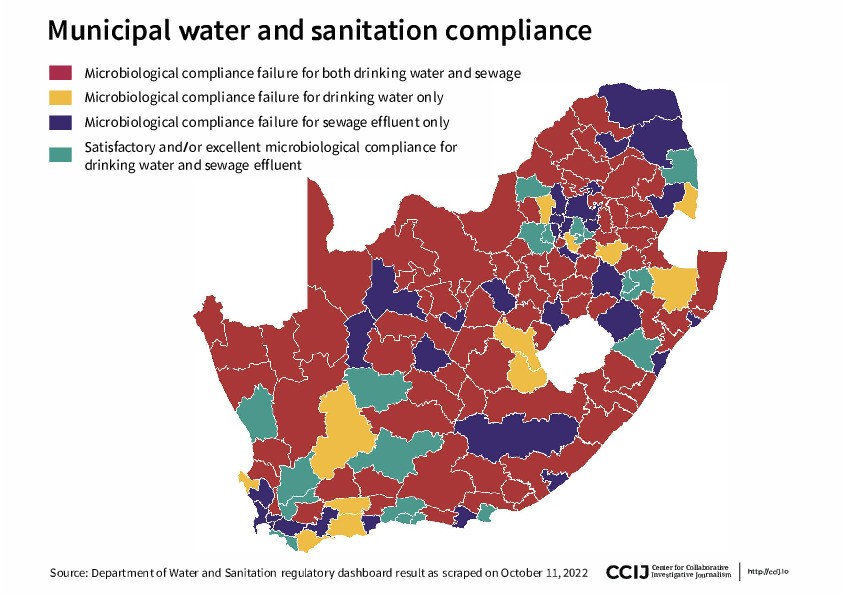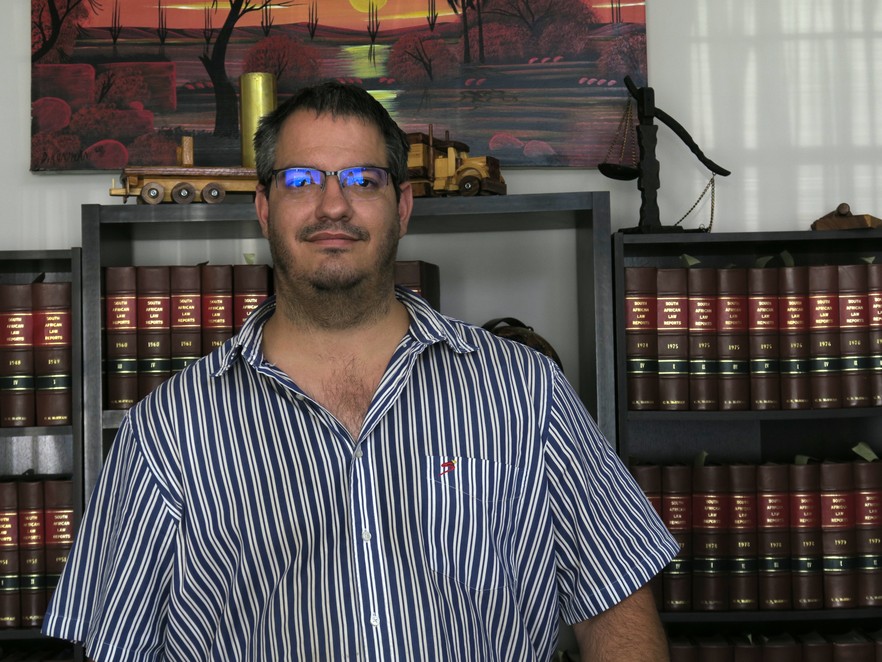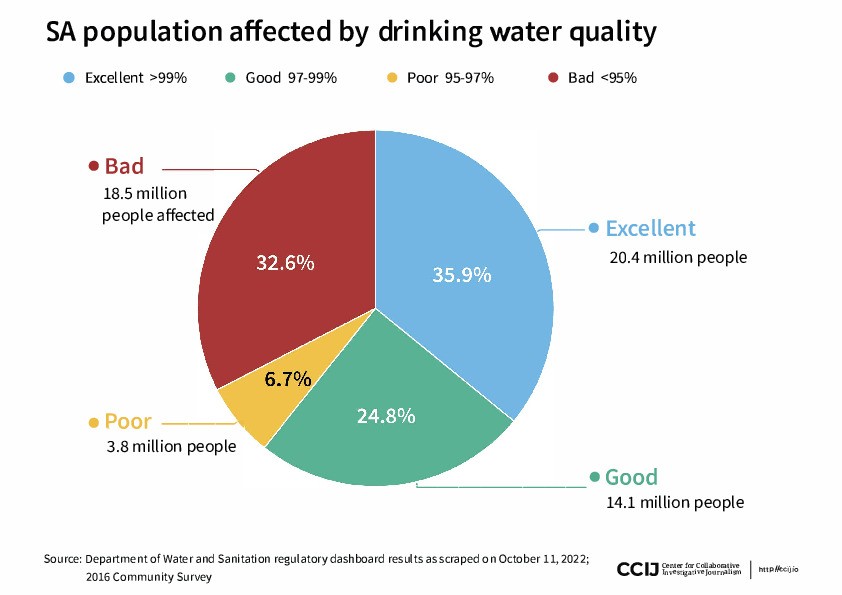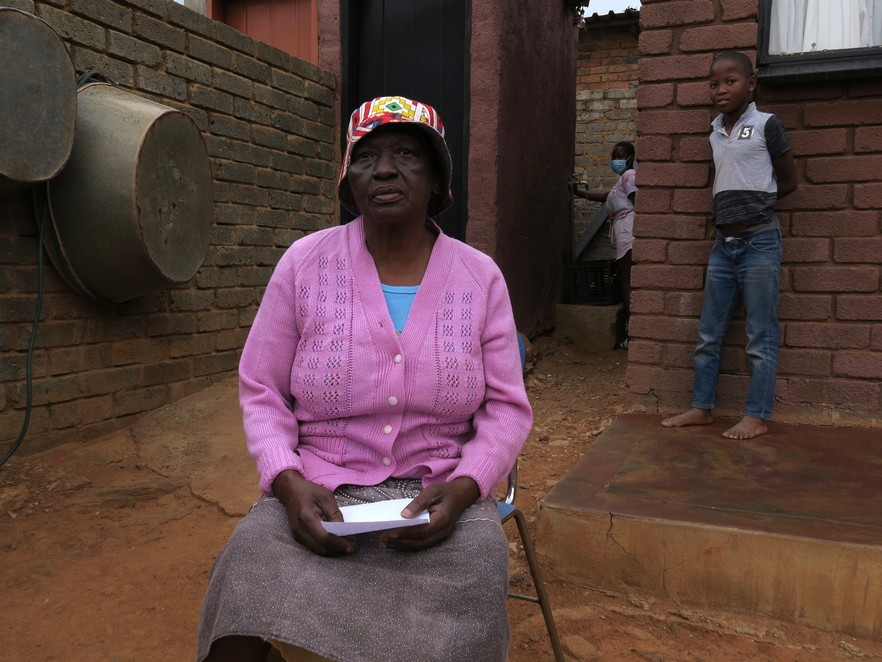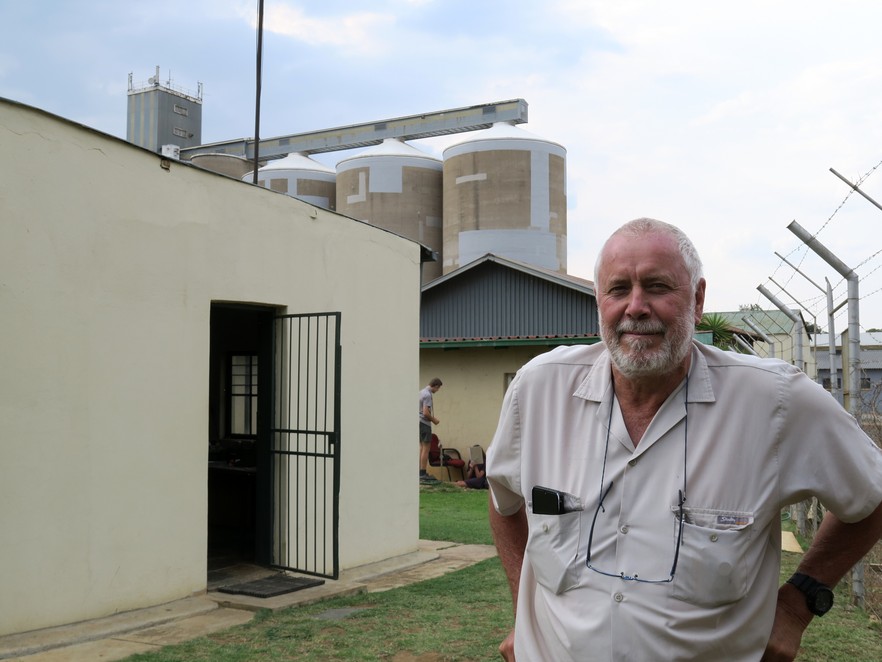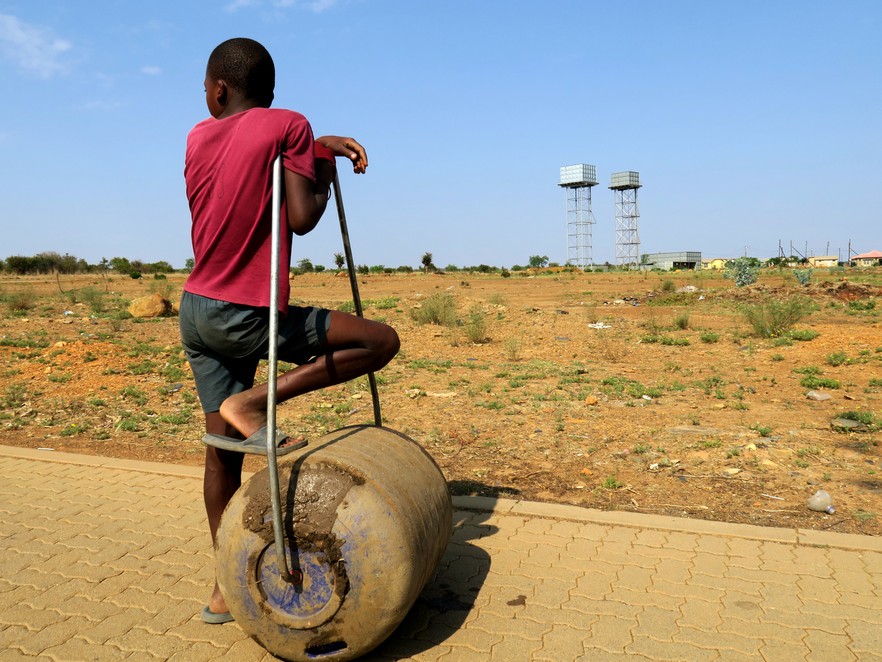- Piped water in two-thirds of South Africa’s municipalities does not meet minimum standards.
- Untreated sewage often flows into drinking water dams.
- Failure by national and provincial authorities to take action sees citizen groups approaching the courts.
Almost two-thirds of South African municipalities responsible for supplying drinking water to residents are either failing to provide water that meets the minimum drinking standards, or simply failing to test the water they supply.
Not all South Africa’s municipalities are responsible for treating and supplying drinking water to residents. Many municipalities are supplied by water boards which are state-owned companies. But of the 144 municipalities that do treat and supply water, 94 were failing as of 11 October. These municipalities are responsible for supplying drinking water to at least 22 million people, when matched against Stats SA’s 2016 Community Survey.
Exacerbating the situation, 112 of 144 (77%) of these municipalities that supply drinking water were polluting streams, rivers, and oceans with untreated or partially treated sewage. Overlapping drinking water and sewage treatment failures were evident in 81 municipalities.
These statistics are extracted from the Department of Water and Sanitation’s own publicly accessible water and sanitation data repository.
And geolocation and field research reveal that in many cases where sewage works are or have been failing, such as in Winburg in the Free State, Emalahleni and Standerton in Mpumalanga, Buffalo City in the Eastern Cape, and Koster and Swartruggens in the North West, untreated or partially treated water is polluting the dams from which drinking water is extracted.
There are also communities such as Mazista and Mogogelo in the North West Province, Makhanda, Fort Beaufort and Butterworth in the Eastern Cape, Mbokoto village in Limpopo, and the entire Ugu District Municipality on the KwaZulu-Natal south coast, which do not receive water or have suffered water outages lasting days or even weeks. These are just some examples extracted from a current news search.
South Africa’s largest city, and the country’s economic hub, Johannesburg, is not exempt. Although water to Johannesburg is supplied by Rand Water – a state-owned company – and meets quality standards, water distribution is a municipal responsibility, and this year for the first time, water distribution to large parts of the city is failing. Unlike water shortages experienced in the city of Gqeberha in the Eastern Cape, Johannesburg’s water shortages are not due to drought – the Vaal Dam from which it obtains water is about 91% full. The shortages are due to infrastructure and planning failures, exacerbated by loadshedding, according to reports.
But many municipalities have been suffering dirty water and intermittent supply for years. And in the face of inaction, or at best ineffective action, from relevant national government departments such as the Department of Water and Sanitation, some citizens have decided to take matters into their own hands.
Seeking help from the courts
“It was December 2019 when we approached the court,” said attorney Adreas Peens in Koster, a small town in the Kgetlengrivier municipality in the North West Province.
Peens represents the Kgetlengrivier Concerned Citizens, who went to the Magistrate’s Court to grant them access to the water treatment works so they could get it running again after it had been shut down during a municipal workers’ strike over salary increases.
The court granted them access, and the water supply was restored.
Adreas Peens is a lawyer who has represented Kgetlengrivier Concerned Citizens. Photo: Steve Kretzmann
This success, said Peens, gave the concerned citizens courage to address the municipality’s longstanding water and sanitation failures through the courts.
A year later, in December 2020, Peens was in the North West Division High Court with an urgent application to take custodianship of the municipal water treatment works and the sewage works.
He said raw sewage was being diverted via ditches and pipes from the sewage works in Koster, and the nearby town of Swartruggens, straight into the Koster and Elands Rivers. The discharge in both cases was upstream of the dams supplying drinking water to the towns.
Swartruggens farmer Wilhelm Rocher, who in November last year was elected as an independent municipal councillor, said sewage had been flowing into the Swartruggens dam since at least 2014.
On 18 December 2020, Judge Samkelo Gura ruled in favour of the citizens, ordering the municipality to stop raw sewage flowing into the rivers – an issue which had not been resolved despite a visit from the provincial environmental affairs minister – and to immediately fix the causes of the problem. Judge Gura also declared that the water treatment works at the two towns were in “states of disrepair”, and “mismanaged”.
The interim order gave the municipality two weeks to put an end to sewage pollution and provide a continuous supply of clean drinking water. Failure to do so would allow the concerned citizens to “take control” of the infrastructure, and the municipal manager would serve a minimum 90 days prison sentence.
The municipality did not meet the terms of the order. By early January, Willie Jones, an engineer and head of Jones Masjiene, a 20-year-old family business manufacturing agricultural equipment, was at the helm of a team repairing the water treatment works and sewage works. Within days, they were supplying clean water and releasing clean sewage effluent. On 21 February, news programme Carte Blanche posted a video of Jones drinking the treated water released from the Koster sewage plant after it had been fixed. Though the municipality did not meet the two-week deadline to repair its water and sanitation failures, the municipal manager has not been imprisoned. He won a subsequent court appeal.
But, explained Peens, in an expansion of the initial interim order, on 12 January the court ordered the municipality to appoint an “implementing agent” to take control of the water and sewage infrastructure.
Peens said the concerned citizens didn’t want to manage the plants on a permanent basis, only to intervene.
But when once the appointed agent, Magalies Water, a state-owned company originally established in 1969 to provide water to the platinum mines in nearby Rustenberg, took over on 17 March 2021, water supply problems re-emerged.
A partial win
Two weeks after Magalies Water took over, water supply in Koster began to fail, said Rocher.
“We get water for maybe an hour, hour-and-a-half in the morning,” said Kenalemang Morule, who lives in a household of four adults in Koster’s Hospital Heights, within a stone’s throw of the water purification plant.
Interviewed in October this year, Morule said water normally flows from the taps between about 5am and 6am. “We open the taps when we go to sleep, so that the [sound of running]water will wake us up,” he said.
But occasionally the taps stay dry for days or even weeks. “We can go for three weeks without water.”
When that happens, people buy water from those who have boreholes, such as the Bem-Vindo Lodge. The going rate was about R5 for 20 litres. For those without cars, wheelbarrows are used to cart the drums and buckets.
Resident Joseph Moeti said from January to March 2021, “when Jones was in charge”, the water “was good”. Moeti said the water was clean and the supply was regular, and his team even painted the fence around the water purification plant.
“After March (when Magalies Water took over) everything went down again”.
“Jones is a white guy, but he was a good guy,” said Moeti.
Pensioner Mary Montsho, who lives further down the hill in Reagile, said she also only received water “for a few hours” a day, and “sometimes it’s dirty”.
Like her neighbours, she said she filled buckets and barrels when the water flowed, in order to provide enough for the needs of three adults and three children in the house. The youngest is just three years old.
Mary Montsho is a pensioner. She says she only receives piped water for a few hours daily, and sometimes it’s dirty. Photo: Steve Kretzmann
While Montsho, Moeti, and Morule all said they drink the water supplied, data from the Department of Water and Sanitation site, captured on 11 October, showed water quality in Kgetlengrivier municipality was “bad”. It had a microbiological compliance of 94%, indicating the presence of fecal coliforms such as E. coli. The minimum drinking water requirement in order for the water to be labelled “good” is 97%. It was, however, achieving “excellent” status for chemical compliance.
An inspection of the sewage effluent released into the Koster River revealed a clean outflow, showing that what sewage reached the plant, was being effectively treated. But not all the town’s sewage was reaching the sewage works. A significant leak a few hundred metres above the sewage works was evident, with raw sewage running down what appeared to be an old furrow, toward the river.
Wilhelm Rocher is a farmer and independent municipal councillor. Photo: Steven Kretzmann
In Swartruggens, Rocher, who daily checks the drinking water reservoir levels, said the water and sewage were “hundred percent”.
Meanwhile, Peens is involved in ongoing litigation in an effort to have Magalies Water removed as an agent and have Pionier, a for-profit company initiated by the Afrikaans civil society group Afriforum, appointed in its place.
An example for others
The partial, but significant, improvement in water supply and sewage treatment in Kgetlengrivier municipality has spurred residents of Mafube municipality in the Free State to take similar legal action.
In January this year, the Mafube Business Forum took the municipality to court, obtaining a judgment from the Free State High Court in April. The court ordered the municipality, with oversight by provincial authorities, to immediately cease the pollution caused by dysfunctional sewage plant operations. As in the case with Kgetlengrivier, the municipality was told to pay legal costs and relevant provincial authorities who were also cited as respondents.
However, according to Jacques Jansen van Vuuren, chair of the Vaal Dam Reservoir Catchment Forum and liaison officer for the Mafube Business Forum, despite the court’s order, no action has yet been taken by the municipality or the provincial government.
“We are going to court to see if we can get contempt of court charges against those responsible,” said Jansen van Vuuren.
He said untreated sewage from the towns within the municipality, Frankfort, Tweeling, Cornelia, and Villiers, was all flowing to the Vaal Dam, which is the drinking water supply for Johannesburg. Along with other failing municipalities, this contributes to the ongoing threat to Johannesburg’s drinking water supply.
A boy with a drum of water collected from a private farm borehole waits for his friend before continuing home. Behind him are empty water reservoirs meant to supply the state-built homes in Mazista. Photo: Steve Kretzmann
Data shows Mafube municipality fails to report on the quality of sewage effluent, though this is a legal requirement for operating the sewage works. All compliance and monitoring levels are at zero, suggesting the municipality is also not reporting the quality of its drinking water.
Jansen van Vuuren said no drinking water was being delivered to the town of Cornelia at present. He said when they met with the municipal manager on Monday 24 October, two days before speaking to GroundUp, Cornelia had been without water for four days. He said the municipal manager had not provided an explanation.
Doing it for themselves
The picturesque Free State town of Clarens in the Dihlabeng municipality is in the foothills of the majestic Maluti Mountains. Here residents took the problem of water supply failures, due to frequent pipe breakages, into their own hands.
Former chair of the Clarens Village Conservancy, Bastiaan Verhoek, said water pipe breakages began in about 2017, and got to a point where water supply was interrupted to parts of the town three times a week.
“We’re a tourist town with about 200 guesthouses so we had to help ourselves. Visitors wouldn’t come back if they had no water.”
As the municipality had no money to buy the necessary parts, municipal employees would dig down and expose the fault, and “residents would go out and buy the parts,” said Verhoek. He said unlike in Kgetlengrivier municipality, where the court ordered the municipality to refund the concerned citizens the R15.8-million in expenses incurred, the Clarens residents bought the parts out of their own pocket.
He said water supply was now constant, although the pipe network was old and needed to be fully replaced. “Clarens ratepayers are fighting to get that on the budget,” he said.
Regarding water quality, he was of the opinion it was “ok”, although insufficient supply in peak tourist periods prompted the municipality to sacrifice quality in a bid to maintain supply by bypassing the water treatment process.
Department of Water and Sanitation data shows that as of 11 October, Dihlabeng municipality, under which Clarens falls, failed water quality standards, with microbiological compliance cited as ‘poor’ at 97%. Acute chemical compliance was at 0%. In addition, Dihlabeng sewage works were failing, with all sewage compliance indicators within the “bad” or “poor” parameters.
The official response
Questions to Kgetlengrivier and Mafube municipalities were not answered. We could not figure out how to contact Dihlabeng municipality; the website is out of date.
The Department of Water and Sanitation is aware of the deterioration in municipal water and sanitation services, said the department’s director-general Sean Phillips, and as a result has developed a Water Services Improvement Programme. The programme “aims to strengthen government’s support and intervention at municipal level, more consistently and systematically,” said Phillips.
In line with this, the department “is developing rolling regional support and intervention plans” based on the data it collects. This will be managed by the department’s regional offices, in consultation with provincial governments and municipalities.
Phillips said there is no provision in the Water Services Act for the department to issue a directive when drinking water is not compliant. However, he said, there is a legislative review of the Water Services Act underway to empower the department to enforce compliance with drinking water quality.
Currently, the Water Services Act requires national government to monitor performance and should there be performance challenges, the minister may intervene through a Constitutional process.
Sewage pollution, however, violates provisions of the National Water Act, and as such, notices and directives had been served to 88 municipalities during the 2021/22 financial year, related to sewage pollution, Phillips said. These were “triggered by pollution incidents reported and proactive investigations undertaken”.
He said a “vast array” of contraventions had been found, ranging from manhole overflows caused by blockages, malfunctioning pump stations causing sewage overflows in water resources and discharge of “substandard” effluent from wastewater treatment works into water resources.
Phillips said “some” of these municipalities subsequently submitted action plans to address the pollution, some of these plans were inadequate and the department had taken “further enforcement action”.
In some “unfortunate” cases the municipalities had not responded to the department’s instructions, he said.
He said where the municipalities had not complied, the department had initiated civil action. Two examples were Modimolle and Lekwa Local Municipalities, against which the courts had ordered the municipalities to take remedial action. The Modimolle municipality complied, but the department is monitoring Lekwa municipality’s implementation of the court order. (You can read about the situation in Lekwa municipality here).
He said in “certain circumstances” the department would institute criminal action. There were nine municipalities facing criminal charges for contravening provisions of the National Water Act, and some of these had been initiated by the department, Phillips said.
Recently, a case had been opened by a member of the public against the Rand West City Local Municipality for discharging partially treated sewage into a river. The case was heard in the Randfontein Regional Court in May. The court imposed a R10-million fine on the municipality, R7-million of it suspended for five years provided the municipality met certain provisions.
Earlier this year, the Thaba Chweu Local Municipality received a R10-million fine by order of the Lydenburg Magistrate’s Court, for ignoring complaints about sewage spilling into the Dorps River, and allowing waste to pile up on the streets since 2011.
Seeking accountability
But Peens believes fines issued against municipalities are ineffective. And as Phillips states, some municipalities do not even respond. Mafube Local Municipality, which according to Jansen van Vuuren has done nothing to stop the ongoing sewage pollution despite a court order to do so issued six months ago, is a case in point.
Peens says the municipalities pay the fines with ratepayers’ money, and often much of the fine is suspended in any case.
Municipalities will only clean up their act if the responsible officials are sentenced to prison, he believes. For this reason, he was back in the North West Province High Court on 27 October to push an application to have the Kgetlengrivier municipal manager imprisoned as per the original court order. Even a suspended prison sentence would mean a criminal record dismissal from the municipality.
This, he said, would set a precedent, and shock the responsible officials across all South Africa’s failing municipalities.
“Our aim is accountability,” said Peens.
Author: Steve Kretzmann
This article was originally published by GroundUp and is licensed under a Creative Commons Attribution-NoDerivatives 4.0 International License. It is republished with permission. Link to the original article HERE













